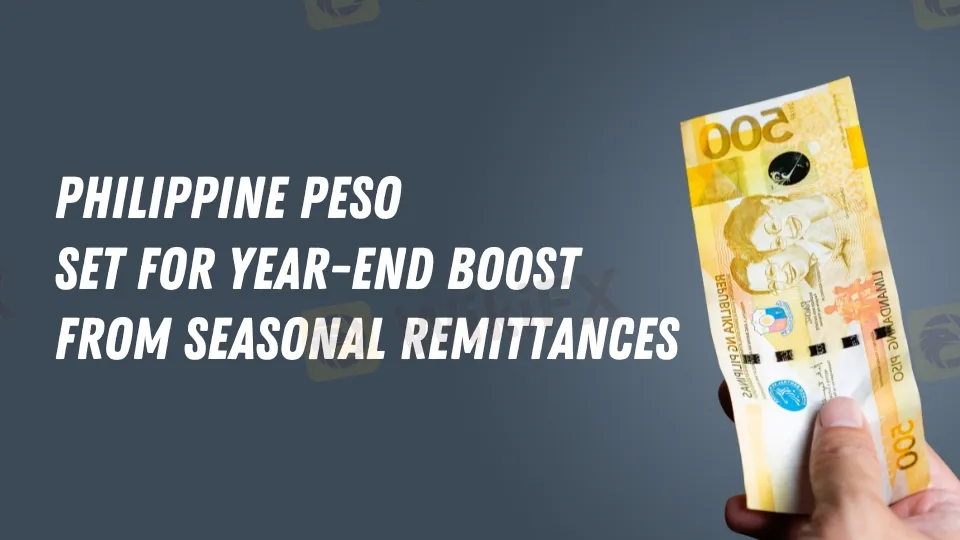简体中文
繁體中文
English
Pусский
日本語
ภาษาไทย
Tiếng Việt
Bahasa Indonesia
Español
हिन्दी
Filippiiniläinen
Français
Deutsch
Português
Türkçe
한국어
العربية
Philippine Peso Set for Year-End Boost from Seasonal Remittances
Abstract:The Philippine peso anticipates a year-end recovery driven by strong remittances, lower oil prices, and easing dollar strength amid the holiday season.

The Philippine peso, which has been under pressure since October, is likely to recover before the end of the year, owing to a seasonal rise in overseas Filipino worker (OFW) remittances. As Christmas approaches, these remittances normally increase, bolstering the value of the peso. This tendency has occurred in six of the previous seven years, and experts predict a similar conclusion in 2024.
According to the Australia and New Zealand Banking Group (ANZ), the peso might rise by more than 5% by the end of the year. The euro has fallen almost 4% this quarter, but experts believe it will reverse. According to Michael Ricafort, chief economist of Rizal Commercial Banking Corp., the peso will rise by around 4% by December. He observes that this seasonal stream of remittances, together with lower world oil prices, provide natural support for the peso.

Remittances reached $33.5 billion in 2023, making it one of the Philippines' most important foreign currency sources. These inflows provide a significant buffer for the peso and may offset the current decline that has driven the currency approaching a record low versus the US dollar.
Furthermore, any rate reduction by the US Federal Reserve may help the peso.
The Philippines is strongly reliant on fuel imports, therefore the drop in world oil prices is especially important. Lower oil prices aid in the reduction of the country's trade imbalance, relieving pressure on the local currency. The peso rose 0.8% this week, trading at 58.26 versus the US dollar.
However, others are concerned about the dollar's potential strength in the face of shifting US policy. Furthermore, future remittances from the United States may be influenced by changes in immigration rules. Nonetheless, experts observe that the Philippines' lower inflation rates and positive balance of payments provide a favorable environment for the peso's rise until the end of the year.
Khoon Goh, director of Asia research at ANZ, believes the peso will rise to 55.5 per dollar by December.
Final Thoughts
As the Christmas season approaches, the Philippine peso is expected to benefit from increased remittances and reduced oil costs. While certain dangers remain, a healthy balance of payments and low inflation indicate that the peso is on pace for a year-end rebound, offering hope for the Philippine economy in the face of global uncertainty.

Disclaimer:
The views in this article only represent the author's personal views, and do not constitute investment advice on this platform. This platform does not guarantee the accuracy, completeness and timeliness of the information in the article, and will not be liable for any loss caused by the use of or reliance on the information in the article.
Read more

The Hidden Checklist: Five Unconventional Steps to Vet Your Broker
Forex broker scams continue to evolve, employing new tactics to appear credible and mislead unsuspecting traders. Identifying these fraudulent schemes requires vigilance and strategies beyond the usual advice. Here are five effective methods to help traders assess the legitimacy of a forex broker and avoid potential pitfalls.

Doo Financial Obtains Licenses in BVI and Cayman Islands
Doo Financial, a subsidiary of Singapore-based Doo Group, has expanded its regulatory footprint by securing new offshore licenses from the British Virgin Islands Financial Services Commission (BVI FSC) and the Cayman Islands Monetary Authority (CIMA).

CFI’s New Initiative Aims to Promote Transparency in Trading
A new programme has been launched by CFI to address the growing need for transparency and awareness in online trading. Named “Trading Transparency+: Empowering Awareness and Clarity in Trading,” the initiative seeks to combat misinformation and equip individuals with resources to evaluate whether trading aligns with their financial goals and circumstances.

Malaysian-Thai Fraud Syndicate Dismantled, Millions in Losses Reported
The Royal Malaysia Police (PDRM) has received 26 reports concerning the Nicshare and CommonApps investment schemes, both linked to a major fraudulent syndicate led by a Malaysian citizen. The syndicate’s activities came to light following the arrest of its leader by Thai authorities on 16 December.
WikiFX Broker
Latest News
ASIC Sues Binance Australia Derivatives for Misclassifying Retail Clients
WikiFX Review: Is FxPro Reliable?
Malaysian-Thai Fraud Syndicate Dismantled, Millions in Losses Reported
Trading frauds topped the list of scams in India- Report Reveals
AIMS Broker Review
The Hidden Checklist: Five Unconventional Steps to Vet Your Broker
Russia to Fully Ban Crypto Mining in 10 Regions Starting January 1, 2025
YAMARKETS' Jingle Bells Christmas Offer!
Why is there so much exposure against PrimeX Capital?
Doo Financial Expands Regulatory Reach with Offshore Licenses in BVI and Cayman Islands
Currency Calculator


